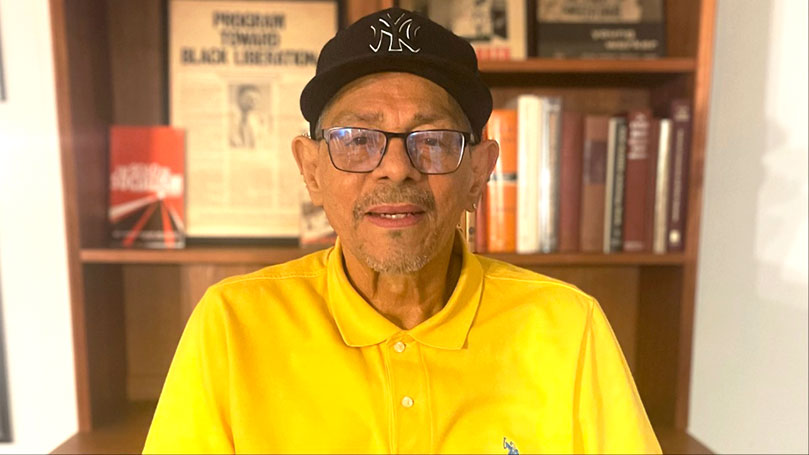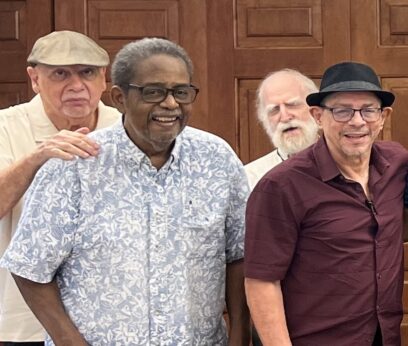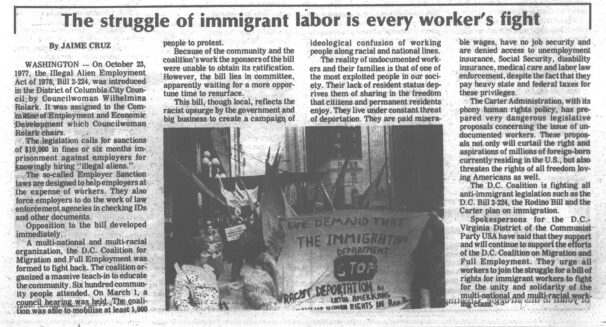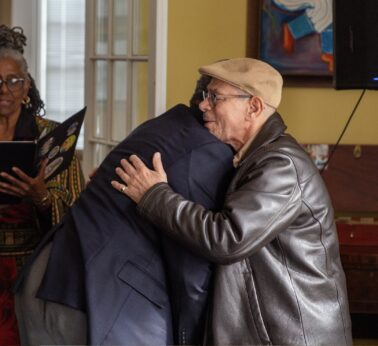
This article was originally published in People’s World. On Sept. 20, 2025, the author recorded an oral history with Jaime Cruz, Jr. Cruz passed away a little more than a month later, on Oct. 30. This short biography is a summary of those recordings.
Jaime Cruz, Jr. was born on May 24, 1951, in New York City. He grew up in Spanish Harlem on 100th St., between 1st and 2nd Avenues. Born into a working-class Puerto Rican family of five siblings, he grew up poor and a frequent victim of racism. He would go with his mother to social services in order to help them stay eligible for public assistance, assisting her with translation. Encountering the racism and indifference of the officials there served as an early moment which shaped his consciousness and awareness of injustice.
In his younger years, he struggled with the drug culture he was surrounded by and had complications with prison and addiction. His recovery and political journey began when he moved to Washington, D.C. He had heard about a recovery program called RAP (Regional Addiction Prevention), Inc., and convinced a judge to show him leniency so he could go through it.
It was during his time at RAP that he began to encounter political literature that contextualized his own experiences. He learned about the Black Panther Party, the Young Lords, and other radical movements that were active at the time. A particularly impactful piece for him was one called “Capitalism Plus Dope Equals Genocide,” by Michael Tabor. But the most significant moment for Cruz was his trip to Cuba on the Venceremos Brigade in 1976.
 Cruz felt that Cuba — where he saw socialism in practice and first stepped foot on liberated land in the Caribbean — helped him to find answers and to find himself. He was in Cuba for almost three months, staying at the Julio Antonio Mella International Camp, working on construction projects, and learning about the revolutionary process.
Cruz felt that Cuba — where he saw socialism in practice and first stepped foot on liberated land in the Caribbean — helped him to find answers and to find himself. He was in Cuba for almost three months, staying at the Julio Antonio Mella International Camp, working on construction projects, and learning about the revolutionary process.
When Cruz returned, he joined the Young Workers Liberation League and the Communist Party USA. While in the YWLL, Cruz worked on a number of campaigns. He spoke at high schools in D.C. about the Wilmington Ten, ten Black youths brought up on false charges. The National Alliance Against Racist and Political Repression (NAARPR) had taken up their case, and it was through this campaign that Cruz began to get a feel for public speaking and leadership.
A short time later, he became the D.C. coordinator of the Youth March for Jobs campaign, which sought to tackle the crisis of unemployment and super-exploitation facing youth, particularly youth of color.
Cruz also worked with the YWLL’s Cabral-Tubman Center for Marxist-Leninist Education, named after Amilcar Cabral and Harriet Tubman, which opened on June 1, 1974. The Cabral-Tubman Center taught the Adams-Morgan community about Marxism, the freedom struggle, and international politics, hosting lectures, events, and study groups from a wide range of people. The center’s bookstore, housed on 18th St., also served as a community space.
Cruz’s activity in the youth movement led him to work closely with students at the Howard University campus, where he was a part of study groups led by one of his mentors, Acie Byrd. While attending Antioch College, he was also mentored by Jack O’Dell, another important figure in Communist history. As he discussed figures like Acie Byrd and Jack O’Dell, Jaime became emotional, and emphasized the impact these figures had on his development as a Communist.
In the 1980s, Cruz was a part of establishing the International Solidarity Committee, which was a part of Rev. Jesse Jackson’s Rainbow Coalition, raising awareness about freedom struggles in Haiti and South Africa. He also worked alongside his comrade and best friend, Arturo Griffiths, in building D.C.’s Latino Festival and fighting for immigrant justice.

Cruz also lived in Puerto Rico twice. The first time he worked as an organizer with Union Member Health Services and lived with Marie Ramos Rosado, whom he assisted in research on Black women’s impact on Puerto Rican literature. The second time he was employed at a casino in downtown San Juan while completing his bachelors and masters degrees at the University of Turabo. After finishing his higher education, he and his wife, Mary Lee Ramirez, worked managing a facility for the care of the elderly. In 2004, he returned to the United States, and in 2015, Cruz’s wife passed.
The liberation of Puerto Rico was deeply important and central to Cruz’s life. He spoke often of the need to understand the colonial domination of the island by the United States and the U.S. left’s duty to fight for its freedom. Cruz was dedicated wholeheartedly to the fight for Puerto Rican independence from colonial rule and frequently shared details of the devastation he saw on the island at the hands of U.S. colonialism.
While always an internationalist, he maintained that his first loyalty was always to his people in Puerto Rico. He emphasized that “Puerto Rican culture is not an obsession, it’s who we are … Our love for freedom, love for justice, love for knowledge, and love for our families.”
In the late 2010s, Cruz and Arturo Griffiths were having a conversation when they landed upon a decision that there needed to be some kind of organization which could “empower our youth with the tools to fight back, to prepare them. And through those tools, it will give them the confidence they need to fight back vigorously.”
 Out of this discussion came the Claudia Jones School for Political Education, which held its first event in the Embassy of Nicaragua in 2020 and brought together a new generation of organizers. The Claudia Jones School has been organizing in D.C. ever since, putting into practice the ideas of Cruz, Griffiths, and a number of other movement veterans who helped to shape it.
Out of this discussion came the Claudia Jones School for Political Education, which held its first event in the Embassy of Nicaragua in 2020 and brought together a new generation of organizers. The Claudia Jones School has been organizing in D.C. ever since, putting into practice the ideas of Cruz, Griffiths, and a number of other movement veterans who helped to shape it.
Jaime Cruz, Jr., was an ardent fighter for the cause of socialism, Puerto Rican independence, and the liberation of all nationally and racially oppressed peoples. He was also a fierce advocate for rehabilitation and recovery and emphasized the importance of sharing his story. He explained, “I speak about me growing up as an example of what one can do, you know, change the life from becoming a drug addict.”
He said, “If you could be a junior high school dropout, right? A dope fiend from 14 to 21 being …locked up in prison, being away in a cage for 16 months and changing all that around … I’m trying to show and demonstrate that you could be at the lowest point at a certain period in your life, and you can pick yourself up and be the very best.”
Rather than express shame or embarrassment at his past, he was always deeply proud to share where he had been and how he overcame it. He understood that it could help others who had been in similar situations and considered sharing those experiences to be a duty.
Cruz joined the Communist Party in 1976, and remained a member until the day he died. After 50 years in the party, he said “I’ve been a lucky person. I’ve had the opportunity to meet some great human beings that have come into my life, and it would have never happened if it wasn’t for the party. I owe the party everything. It just opened up doors, you know? And just like me, it’s opened up doors for other people.”
Cruz leaves behind a large legacy, one that is carried on in D.C. through the work of the Claudia Jones School. He imparted his wisdom to many, the wisdom of his many years of organizing, the wisdom of his mentors Jack O’Dell and Acie Byrd, and the wisdom of his comrades.
Jaime Cruz, Jr., will be deeply missed. The movement is deeply indebted to his half-century in the struggle for the liberation of our multi-national, multi-racial working class. Hopefully this brief summary of his life will inspire its readers just as he inspired the lives of those he mentored.
Images: 1. Jaime Cruz, Jr., at the recording of this oral history, just over a month before his passing. (Bennett S. / People’s World) 2. Jaime Cruz, Jr. with Arturo Griffiths. Behind them, from left to right, are Carl Gentile and Mark Gruenberg. (People’s World) 3. ‘The Struggle of Immigrant Labor is Every Worker’s Fight,” an article by Jaime Cruz published April 8, 1978 in the Daily World, predecessor to People’s World. (People’s World Archives) 4. Jaime Cruz, Jr., hugs Francisco Campbell, Nicaraguan Ambassador to the United States, at an event marking the anniversary of the founding of the Claudia Jones School for Political Education. (People’s World)


 Join Now
Join Now